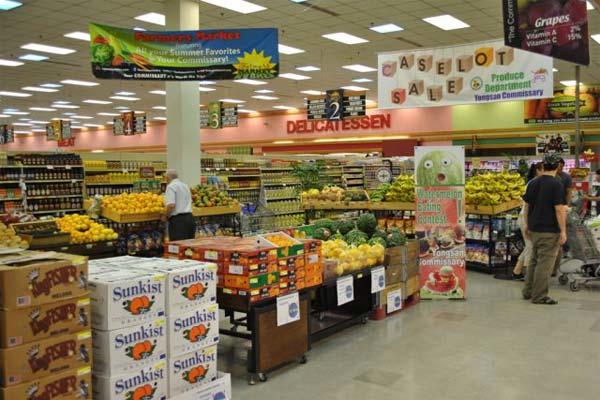A lawmaker on a key defense committee has asked the Defense Department to launch an investigation into the Defense Commissary Agency's recently changed produce pricing structure in Asia and Guam.
Rep. Duncan Hunter, a Republican from California and a member of the House Armed Services Committee, also wants the review to determine whether shoppers are being asked to not report prices or photos of items to lawmakers or the media and whether agency officials lied to Congress.
"I write to you today to share my frustrations regarding commissary produce in Asian and Guam and to ask you for your support in ensuring that our military men and women, and their families, are able to access the commissary benefits that they were promised when they swore to defend this country," Hunter wrote to Deputy Defense Secretary Robert Work in the April 1 letter.
"The Defense Commissary Agency has proven itself unwilling to uphold this benefit, and I hope that you will take appropriate actions to ensure that our promises to our troops are upheld," he added.
In an emailed response to Military.com, the agency said it doesn't "intimidate" patrons to prevent them from reporting unfavorable news.
"Quite the contrary, we engage in vibrant social media and patron 'Your Action Line' programs that encourage patrons to give us honest feedback about their commissary benefit," it said in a statement. "We always welcome patrons to inform store managers whenever they have a problem with anything in the store."
The agency acknowledged there are "certain restrictions" on photography at stores, but those are security measures designed to prevent the photographing of secure areas such as cash cages, warehouse areas and entrances. Patrons can still take photos inside the store, so long as they don't violate another's privacy, it said.
Produce prices at commissaries in Japan, Korea and Guam have been the source of debate between the agency and Congress since 2014, when a new contract called for eliminating the taxpayer shipping subsidy. Prices in those areas had been based on the cost of purchasing the goods and did not factor in the roughly $48 million cost of transporting them there.
The new contract, which took effect in late 2015, requires the contractor rather than the government to pay for that shipping, which means those costs are now passed on to patrons. The contract change brought in a major price spike late last year, which commissary officials said was the result of "sourcing challenges." Those prices were reported to have leveled out early this year.
Now Hunter says in the letter that he has received reports of "shockingly high prices, empty shelves and rotten produce available for sale."
The lawmaker also said he'd concerned that officials are lowering prices at those stores only during times of scrutiny so that it appears the situation is more stable than it actually is.
"I have also heard of oddly timed 'Manager's Specials' that reduce prices for a week, only to have prices quickly rebound to their previous heights," he wrote. "I have heard it suggested that these price reductions might happen to coincide with when DeCA is evaluating the prices of produce in the commissary versus the prices of produce available outside the base at commercial grocery stores."
Hunter added, "As I know you would agree, this behavior, if true, would be unethical and would mislead the public when evaluating whether, and to what extent, the new contract is performing."
The agency, known as DeCA, took strong exception to Hunter's criticism over the pricing and quality of produce abroad.
"The suggestion that 'manager's specials' are an 'illusion' that DeCA is not delivering the best prices on produce in Guam is also far from reality," it said. "Our manager's specials and any other promotions are designed to augment the everyday savings our patrons receive by shopping their commissary.
"In the case of fresh fruits and vegetables in Guam, the local contractor has been performing to the standards of the contract, meeting patron savings on our high volume core items in comparison to prices of similar products downtown," it added. "If anything, contractor support, product quality and pricing have vastly improved within the past several months; DeCA personnel continue to work diligently with the contractor to ensure continued and expansive success."
The lawmaker has asked the deputy defense secretary to audit the fresh fruit and vegetable contracts for Asia and the Pacific, and to launch an inspector general investigation into the "managers specials," whether officials misled or lied to lawmakers on issues surrounding the contract changes and whether the agency "has tried to intimidate patrons and others into not taking pictures and not reporting supply shortages, price increases or other unfavorable news."
A measure included in the House version of the 2016 National Defense Authorization bill blocked the commissary from passing on the produce shipping cost to patrons in Asia and Guam. That rule was ultimately removed from the legislation before it was signed into law.
-- Amy Bushatz can be reached at amy.bushatz@military.com. Follow her on Twitter at @amybushatz.



























